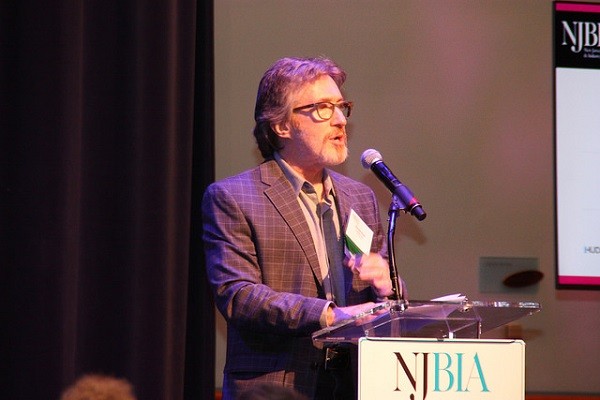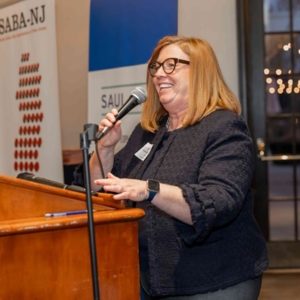NJBIA Economic Policy Forum Ponders, “Can Tech Help Revitalize New Jersey’s Distressed Cities?”

When she introduced keynote speaker Don Katz, founder and CEO of Audible, Michele N. Siekerka, president and CEO of the New Jersey Business & Industry Association, called him “a true catalyst for Newark’s comeback. His community building efforts are proof that great companies build great communities.”
Siekerka made her remarks at the 2018 Economic Policy Forum, “A Tale of Tech Cities : Innovation & Urban Revitalization,” held on April 30 in Newark.
In fact, Katz’s talk was about how to apply some of the principles he had learned at Audible, both before and after the company’s association with Amazon, to the revitalization of the urban cores of cities in New Jersey. He also proposed some tax incentives that would target high-growth companies.
Katz began by noting that Amazon employees who have ambitious ideas for products or services can articulate them by writing a press release in advance. They then work backwards, creating the product or service that will fulfill their vision expressed in the release. Next, a consensus is built around that powerful vision, he said.
This is an important sea change “that we can create here in New Jersey,” he said.
New Jersey cities should follow the example set by Newark in its quest to capture Amazon’s HQ2, he advised. “Public leaders who need to seek reelection; developers who need to fill their spaces… nonprofits who consistently need more money to exist; and companies, investment funds and investors who usually separate the pursuit of their corporate goals from their social responsibility” all came together around a single document.
Instead of having vision, New Jersey has often looked backwards, Katz said, with a tendency to “sustain the entrenched and the status quo.” Our habit of looking behind or sideways has kept innovation, taxable revenue and other factors that could reduce income inequality idling in the state, he said.
Audible’s Success Story in Newark
Katz then went into what has made Audible such a success story in Newark. He moved the audio book company to the city in 2007, when it had 100 employees. It now has 1,400 employees. Audible moved to Newark with the mission of becoming a part of the “turnaround of a challenged city.”
One of the first things Audible did to make a difference was to declare that “all paid internships go to kids from Newark.” It seemed like the right thing to do, and it ended the practice of nepotism in hiring, Katz said.
“Everything began to change about our company as these amazing kids came in from the charter schools and the public sector.” Adding the students to the milieu of “English majors turned businesspeople,” tech experts and actors that performed the spoken word “created a culture that made us a better place to work.” The company actually became known for its exceptional work environment. “It’s actually good to get a reputation as being ahead of the curve.”
Then Audible figured out how to incorporate all kinds of Newark residents into the “tech orb.” It had to look past traditional resumes to give a chance to people whose lack of privilege prevented them from being obvious candidates on paper. “We figured out how to train them into our jobs, and our customer care organization just brims with positive energy, and the power of giving people a chance.”
Realizing that young adults who graduated from the K-12 system in Newark didn’t possess the vocabulary of the workplace, the company developed curricula to make sure that people working at Audible got exposure to that vocabulary.
Audible also subsidized employees living in Newark, and “this involved new economic models,” Katz said. “It seems like a lot of money to give people hundreds of dollars a month to live closer to work.” However, “the productivity return … when you model it, is pretty impressive. It’s just not obvious. You have to go deep.”
The company also subsidized the cost of eating out for its employees. “This is a problem in a city with too much glass and steel.” People stay in their fortresses. You have to entice people to go out. For this reason, said Katz, Audible enticed Barcade, the hipster bar in Brooklyn, to open a branch in Newark.
“Streetscape creation is absolutely important,” he said a number of times during his speech; and he added that creating an inviting place for people to visit before, after and during work will also be part of the revitalization of other New Jersey cities.
Newark Venture Partners
When he became involved with Newark, Katz thought the city should be repositioned around the “stunning bandwidth under the streets,” to turn it into a growth center. Thus began his quest to start Newark Venture Partners. Tech jobs tend to create five service-sector jobs and two professional jobs, Katz continued. And in a turnaround tech community, high school grads tend to make more money than college grads do in manufacturing turnaround communities, he said.
So far, some “2,000 companies around the world have tried to get into this amazing experiment,” Katz noted. Some 46 companies have been funded. The idea was to create great companies, measurable job growth and measurable taxable revenue.
“We’ve had 6,000 people come over and visit Newark, simply because of Newark Venture Partners, and among them were some of the nation’s leading venture capitalists.”
One of the ideas behind NVP was that Audible would offer its domain expertise to NVP’s portfolio companies, Katz said. There are 200 specialists from Audible who coach the NVP startups. “This turned out to be a tremendous draw” because you don’t need as much capital to establish startups anymore, now that there’s the cloud. “So, the companies want expertise, they want coaching, they want people who can help them get to the next level.” All of NVP’s corporate partners have added expertise from their employee base to the business model, and have contributed all sorts of business development ideas, Katz stated.
The process of raising the money for the fund, which was a personal effort, was a “real challenge” for Katz. “To try to convey this kind of double bottom-line vision to people who were pretty much fixed in how they had made their money … or [who already] had a lot of money” was difficult. It was a challenge to find people willing to try something new, he added.
Proposals for the State
Speaking about what the state should do to encourage high-tech growth companies, Katz recommended a moratorium on all retention efforts throughout the state. The governor should “look anew at every investment the state makes with its dollars through the eyes of a high-growth company, versus the many mature companies that are well past their job-growth phases and are more into delivering shareholder profit.”
If you focus everything on companies that grow 10 percent a year or more, the thinking process will change, he said. “We have a bill drafted for an emerging tech urban grant program. The idea is if you move a company to Camden, Trenton, Newark or Paterson, and you are able to grow” above 10 percent in revenue and jobs, “the state pays your cloud bill.”
This is a tiny targeted investment compared with moving a huge corporation from one place to another without growing jobs significantly, he said. And if you add a subsidy for companies if a certain percentage of their employees actually settle in an urban core, you “suddenly have a program that’s scalable,” and that can be held up as an example of New Jersey’s ingenuity and progress.
Katz said that the Cory Booker-supported rider to the tax bill that allows governors to declare opportunity zones will make it possible for stored capital in founders’ stocks or funds to be channeled into urban cores. He praised Jay Bhatti’s idea of bringing employee stock-ownership plans into the mix, and noted that that, by continuing and expanding the Angel Investor Tax Credit and Technology Business Tax Certificate Transfer (NOL) programs, the state could have a great overall program aimed at high-growth companies.
Regarding the NOL program, which is administered by the New Jersey Economic Development Authority, he said, “Those $250,000 and $500,000 checks at the end of the year in our ‘near death experience’ phase made a big difference.” If you package that together with “something Phil Murphy can talk about in a coherent way, you’ve just changed the brand of a state.”
Katz also suggested that the state create incentives for New Jersey graduates to start businesses here and that it welcome non-U.S. capital and investment. There are many foreign business people who think of New Jersey as no different from Brooklyn, he said, and we should be trying to capture that investment.

